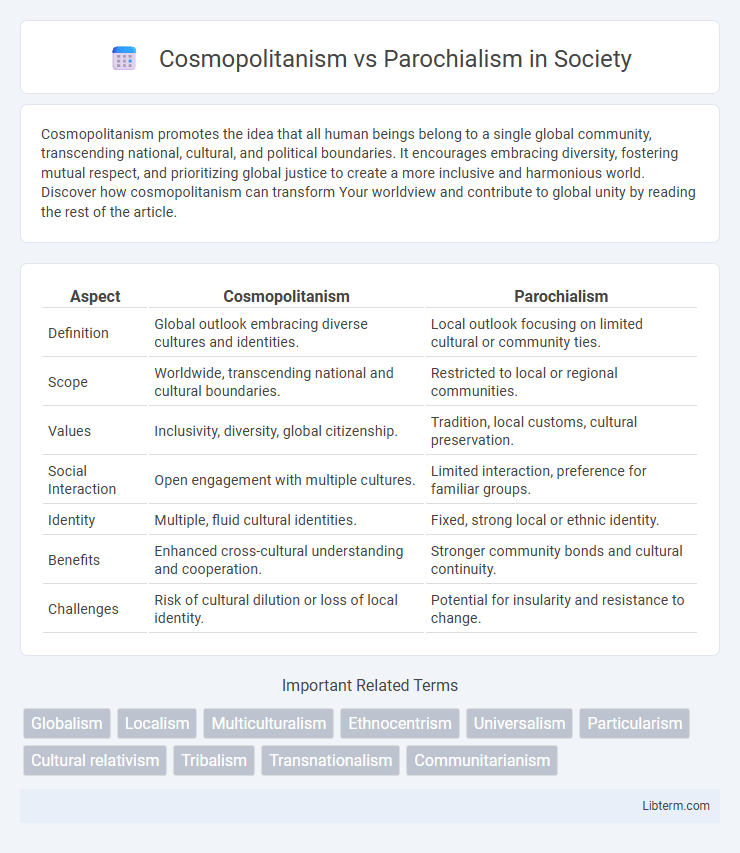Cosmopolitanism promotes the idea that all human beings belong to a single global community, transcending national, cultural, and political boundaries. It encourages embracing diversity, fostering mutual respect, and prioritizing global justice to create a more inclusive and harmonious world. Discover how cosmopolitanism can transform Your worldview and contribute to global unity by reading the rest of the article.
Table of Comparison
| Aspect | Cosmopolitanism | Parochialism |
|---|---|---|
| Definition | Global outlook embracing diverse cultures and identities. | Local outlook focusing on limited cultural or community ties. |
| Scope | Worldwide, transcending national and cultural boundaries. | Restricted to local or regional communities. |
| Values | Inclusivity, diversity, global citizenship. | Tradition, local customs, cultural preservation. |
| Social Interaction | Open engagement with multiple cultures. | Limited interaction, preference for familiar groups. |
| Identity | Multiple, fluid cultural identities. | Fixed, strong local or ethnic identity. |
| Benefits | Enhanced cross-cultural understanding and cooperation. | Stronger community bonds and cultural continuity. |
| Challenges | Risk of cultural dilution or loss of local identity. | Potential for insularity and resistance to change. |
Defining Cosmopolitanism: A Global Outlook
Cosmopolitanism embodies a global outlook embracing cultural diversity, universal human rights, and interconnectedness beyond national boundaries. It promotes inclusive citizenship and ethical responsibility towards all humanity, fostering dialogue and cooperation across cultures. By valuing global competence and transnational identities, cosmopolitanism challenges parochialism's limited, local perspectives and encourages a more integrated world view.
Understanding Parochialism: Localized Perspectives
Parochialism emphasizes localized perspectives by prioritizing the values, customs, and interests of specific communities over global or universal viewpoints. This mindset often fosters strong community identity and social cohesion but can limit openness to external ideas and diversity. Understanding parochialism involves recognizing its role in shaping social behavior and cultural preservation within bounded geographic or social spaces.
Historical Roots of Cosmopolitanism and Parochialism
Cosmopolitanism traces its historical roots to ancient Greek philosophy, particularly the Stoics who promoted the idea of a universal human community beyond local identities. Parochialism, by contrast, emerges from tribal and feudal societies where loyalty to kinship, locality, or specific social groups prioritized narrow, insular worldviews. These opposing origins shaped modern debates on global citizenship, emphasizing either inclusive, cross-cultural unity or localized, particularistic allegiance.
Cultural Implications and Social Identity
Cosmopolitanism fosters cultural openness and global interconnectedness, promoting a social identity rooted in diversity and shared human values. In contrast, parochialism emphasizes local traditions and insularity, reinforcing social identity through distinct cultural boundaries and community-specific norms. These differing orientations significantly shape intercultural relations and the inclusivity of social groups.
Economic Impact: Global Integration vs Local Protectionism
Global integration driven by cosmopolitanism fosters cross-border trade, investment, and innovation, enhancing economic growth and efficiency on an international scale. Conversely, parochialism emphasizes local protectionism, often leading to trade barriers, reduced foreign investment, and slower economic adaptation within domestic markets. The tension between these approaches shapes policy decisions, impacting currency flows, labor mobility, and market competitiveness globally.
Education: Broadening Horizons or Preserving Traditions
Education in cosmopolitanism emphasizes fostering global awareness, critical thinking, and multicultural competencies, equipping students to navigate diverse societies and interconnected challenges. Parochial education, conversely, prioritizes the preservation of local languages, customs, and values, aiming to strengthen community identity and continuity. Balancing these approaches can enhance cultural understanding while maintaining distinct traditions in an increasingly globalized world.
Political Consequences of Cosmopolitan and Parochial Views
Cosmopolitanism promotes global cooperation, supporting policies that emphasize human rights, international institutions, and transnational governance, which often lead to more inclusive and equitable political frameworks. Parochialism emphasizes local or national interests, prioritizing sovereignty, cultural preservation, and domestic policies that can result in protectionism and resistance to global integration. Political consequences of cosmopolitan views include increased diplomacy and multilateral agreements, whereas parochialism can foster nationalism and a retreat from international commitments.
Challenges of Balancing Global and Local Values
Balancing global and local values presents significant challenges as cosmopolitanism promotes universal principles and cross-cultural understanding, while parochialism emphasizes local customs and traditions deeply rooted in specific communities. Conflicts often arise in policy-making, education, and cultural preservation when global norms clash with regional identities, leading to tensions in governance and social cohesion. Effective integration requires nuanced approaches that respect local diversity while fostering inclusive global citizenship and shared ethical standards.
Modern Examples: Cosmopolitanism and Parochialism in Practice
Cosmopolitanism manifests in global cities like New York and London, where diverse populations and international business foster cross-cultural exchange and inclusive policies. Parochialism appears in communities emphasizing local traditions, such as rural villages in Japan upholding ancestral customs and resisting external cultural influences. Modern examples highlight tensions between global interconnectedness and preservation of local identity in economic, social, and political spheres.
Future Directions: Toward Global Citizenship or Local Loyalty
Future directions in the debate between cosmopolitanism and parochialism emphasize fostering global citizenship through education that promotes cross-cultural understanding and sustainability awareness. Technological advancements enable increased connectivity, encouraging individuals to adopt a broader, inclusive identity that transcends national borders. However, balancing this with the preservation of local loyalty remains crucial to maintain cultural diversity and community cohesion.
Cosmopolitanism Infographic

 libterm.com
libterm.com